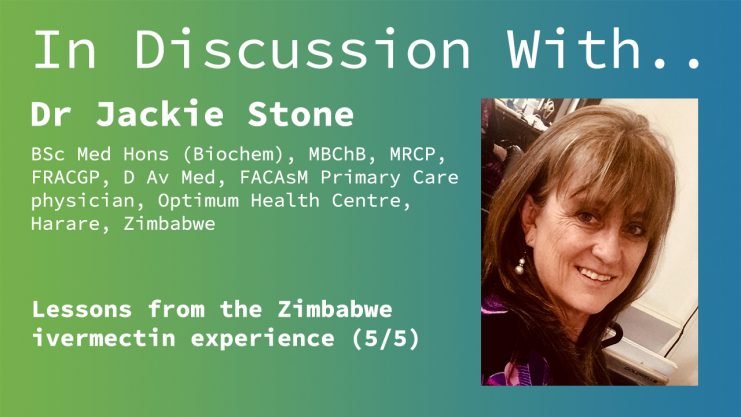Advertisment
Lessons from the Zimbabwe ivermectin experience

Reflecting on ivermectin use in Zimbabwe, Dr Jackie Stone describes how covid-19 is now under control and everyone has the drug in their home medicine cupboard.
In patients with oxygen saturations of 39-90% there was a 3.8% death rate amongst patients cared for by the Hospital at Home scheme compared to the State hospital that has a 35% death rate – almost a tenfold reduction in mortality. In Zimbabwe at the moment, covid is very much under control. Dr Stone is concerned that people might become complacent and discontinue regular prophylactic doses of ivermectin. This matters because there is some concern that Zimbabwe tends to follow Kenya where a third wave is occurring at present.
Ivermectin in the medicine cupboard
Everyone in Zimbabwe now has ivermectin at home and they know the correct protocol for prophylaxis and treatment. Informal communication via WhatsApp usually ensures that important information is rapidly disseminated throughout the country. “People know exactly what to do. So, this time people are getting sick but it’s common for someone to come into me and say, “Listen I started feeling a bit fluey last night – I hope you don’t mind I took some ivermectin last night and I’m here this morning just to check”. So, patients see this as a safe, self-administered medication”, says Dr Stone.
WHO recommendation
Regarding the recent WHO guidance on ivermectin Dr Stone said, “I find it very hard to understand how they can say that there is not sufficient evidence. There are three thousand patients plus in, I think, 24 trials where they demonstrate an over 75% reduction in mortality. Those figures fit exactly with what we have seen”.
She also felt that Zimbabwe was very fortunate to have decisive leadership in the Health Department. “Our Permanent Secretary of Health is a military man, a practical man and a solution-based man and he likes fast solutions. We’ve been very lucky that we were permitted to use it and we can freely use it as doctors now. And for us it makes absolute logical sense in terms of its mechanisms of action. It fits with what we see clinically and so people who [want to] follow the WHO guidelines can do so but if we follow them we are going to go back to 70 deaths a day”, she said.
Experience of HIV and malaria
Experiences with treating HIV and malaria had taught frontline doctors some useful lessons about managing infectious diseases. “Our lesson from HIV is, ‘hit it hard, hit it with combination therapy and hit it early’ “, says Dr Stone. Waiting until the patient has full blown AIDS is costly and risks a poor outcome. “Our lessons from malaria are that if we were to leave a malaria patient to the point where their blood is sludging and they have cerebral malaria we would be seen to be criminally negligent and that mentality pervades through covid because all of our doctors know what happens if you don’t treat malaria early – you end up with a dead patient”, she says. Rapid, aggressive early treatment is the key to success. “I know that when I was working in London I had to be really careful about aggressively managing patients because you could be seen as a cowboy but you can become so cautious that you are far more guilty of acts of omission than cowboy acts of commission. And being very aggressive with a drug that has caused 16 deaths in 32 years in four billion doses is not being a cowboy – it’s trying to save the patient’s life”, says Dr Stone.
Expertise and evidence
“I honestly believe that doctors all over the world have become more scared of the regulators and the lawyers than they are of losing a patient”, says Dr Stone. She believes that clinical decisions should be informed by external evidence but guided by clinical expertise and the patient’s wishes.
“The best possible option for your patient involves the clinical experience of the treating team, the best available evidence and something everyone’s forgotten – the patient’s needs and preferences – and if you can get those three right you’ve got your ideal outcome. Good doctors use both individual clinical expertise and the best available external evidence”, she says.
Dr Jackie Stone holds degrees in medicine and medical biochemistry from the University of Cape Town, South Africa. She has worked in London, Dubai and Australia and holds a Diploma in Aviation Medicine. She now works in family practice in Zimbabwe.
Read and watch the full series on our website.





